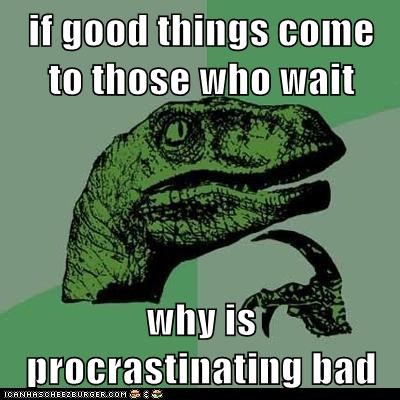So I read this article a while ago called "Will smart technology create a world without work?" about how automation is killing jobs. At one point, the writer was talking about how even something as automation unfriendly as driving a vehicle could someday be the new norm. And while pondering the implications of this new situation, he asks :
If automation can unseat bus drivers, urban deliverymen, long-haul truckers, even cabbies, is any job safe? Vardi (introduced earlier in the article) poses an equally scary question: "Are we prepared for an economy in which 50 percent of people aren't working?"
But something about that question strikes me as being slightly off. The proper emphasis, to me, would be : "What if 50 percent of people didn't need to work?"
Let that sink in a minute...
I for one think that that would be the most awesome thing ever, but that doesn't matter for now. What's important is that soon we'll be given an opportunity to rethink everything we think we know about words like "work", "play", "duty", "responsibility" and "fulfillment". I mean, if we reach a stage where we've effectively secured our free time for all of us, what would that mean for society? What would it be like to live in such times? Literally everything would change because a lot of the old motivations for doing things would be completely thrown out the window. If people's daily sustenance were secure would they then tend to gluttony and excess, or would they use that freedom to do all their "someday" projects? Would the education system become less competitive because you're actually there to learn and not just "secure a good future"? Maybe no one'd care anymore because they'd be too busy watching robot ultimate-fighter matches...
Well I, for one, don't have the faintest clue. But I remain an optimist and believe that in the absence of unnecessary competition, humanity's better nature will finally have a chance to flower.
There's a lot I hope to write about this and related topics in the future but for now I want to specifically speak to two commonly used arguments against trying to free humanity from drudgery.
"If everything can be perfectly manufactured, why would anybody do anything anymore!"
Well technically yes, it would be possible at some point to go into a store and buy a perfect table, say. Heck, you might be able to print one in your own home, perfectly matched to your floor so that it's absolutely horizontal. But to imagine that people will stop making tables just because they don't need to is preposterous. Rather, now that they don't have to do it, it just becomes that more valuable when someone does put their time into making a table. And he might just give it away for free, just happy in the joy of making something. Or if there was some currency in this economy, that table would command a much higher price than one off the assembly line.
In a related line, another argument is :
"Wouldn't everyone just get bored?"
For me, this would be the most interesting part of the whole thought experiment. As Alan Watts would ask "What would you do if money was no object? How would you really enjoy spending your life?" Imagine a society centered around each individual finding the answer to that question, imagine what that would be like. And thinking about it, does anyone look at an infant and wonder how it never gets bored? Well it would stop to eat and sleep and poo and stuff, but more or less all a baby really "needs" to do is to play. And that's what would happen, I fondly imagine life would be a game again.
But I could be wrong, and everybody might get really really bored and start collecting and displaying the results of their nose-mining expeditions. And those samples would be arranged not only chronologically but by shape, size, colour and viscosity or whatever. Maybe there would then be experts in the field who would arise. Perhaps exhibitions and fairs where nose-miners and aficionados the world over gather to discuss the cutting edge of the game. And perhaps some experimental art project would spring up asking people to mail in samples, along with a note about what they were thinking about while they excavated it. Then they could be arranged in a giant mural, covering the side of the building, with the notes made accessible to visitors via an interactive display.
...That'd be sorta beautiful I think, in a strange way. Something about how "We're all in this together", kinda thing.
Meanwhile, for anyone who's not particularly happy with their job at the moment, here's a little something that might be of use to you.
Leave me a comment... What's on your "someday" list?










